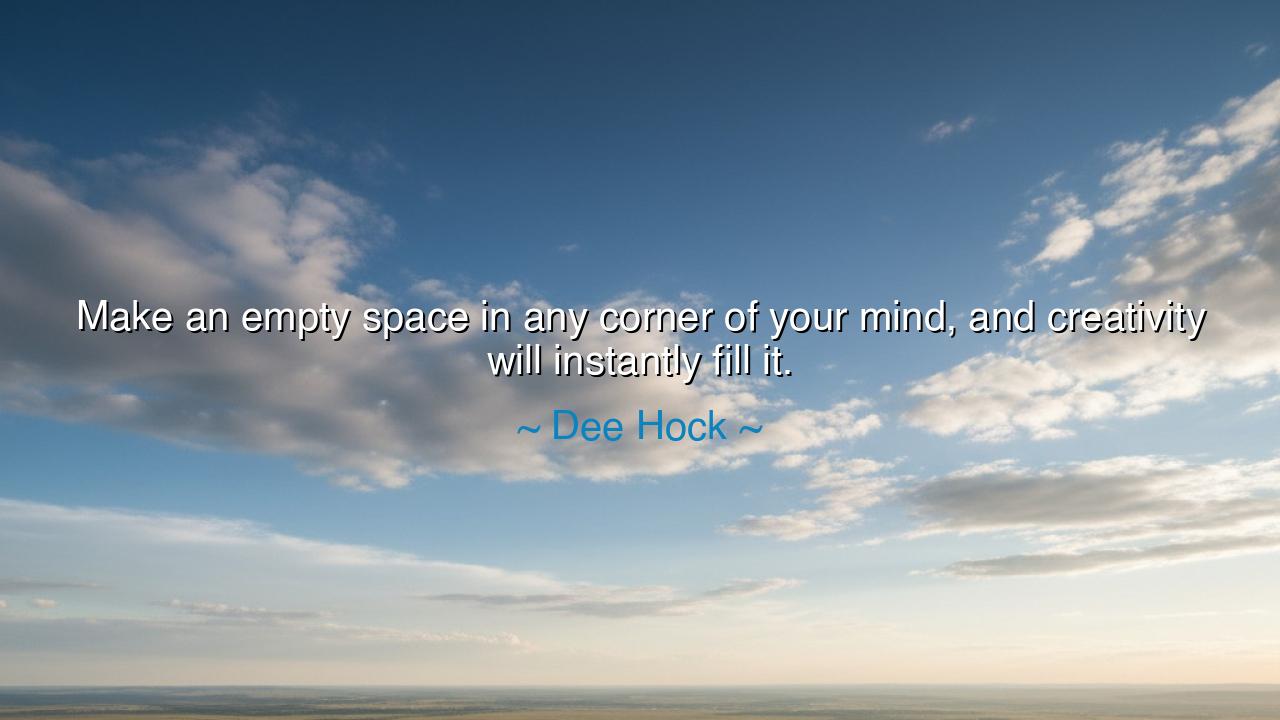
Make an empty space in any corner of your mind, and creativity






"Make an empty space in any corner of your mind, and creativity will instantly fill it." These words from Dee Hock capture a profound truth about the nature of creativity and the mind’s incredible capacity to generate new ideas. Hock, a visionary leader and the creator of VISA, speaks to the very essence of human ingenuity. He understands that the mind is not a vessel that simply absorbs knowledge, but a dynamic force that thrives in the absence of clutter. It is in empty space—the voids that we often seek to fill with distractions or busyness—that the true seeds of creativity are sown.
In the ancient world, the greatest thinkers often spoke of the necessity of stillness in the pursuit of wisdom. Socrates, in his quest for knowledge, often sought the quiet of the mind, a space free from the noise and distractions of society. He believed that wisdom came not from the accumulation of facts, but from the ability to clear the mind of its biases and preconceived notions. In that space of quiet contemplation, the truths of the world could be revealed. In the same way, creativity—like the wisdom of the ancients—arises when we make space for it, when we step away from the demands of the world and allow our minds to wander freely, without constraint.
Consider the story of Leonardo da Vinci, one of the greatest creative minds of all time. Da Vinci was not bound by the limitations of his age. He constantly sought to fill his mind with curiosity—with questions and possibilities that were often outside the scope of what was considered normal. But what set him apart was his ability to empty his mind of expectations and rigid thoughts. He made room for his ideas to breathe and flow freely, unfettered by the constraints of conventional wisdom. Da Vinci’s creativity was not born from a mind overloaded with information, but from one that had space to explore, to experiment, and to create without fear or boundaries.
In our modern world, we are surrounded by constant stimuli—the rush of emails, the endless distractions, the noise of social media. Our minds are often like crowded marketplaces, filled with thoughts and worries that leave little room for new ideas to emerge. Hock’s insight reminds us that creativity cannot thrive in such a cluttered environment. It requires emptiness—a deliberate space where our minds can wander, where we can step away from the noise and listen to the quiet whispers of inspiration. Space, both physical and mental, is the fertile soil in which the seeds of innovation take root.
This principle is not merely philosophical—it is practical. Consider the great inventions and breakthroughs of human history. The telephone, the lightbulb, and the computer were not the products of minds that were overburdened with information and distractions. Rather, these creations came from individuals who made room for curiosity and wonder to guide them. Thomas Edison, for example, was not a man constantly surrounded by the rush of modern life. Instead, he spent hours in his workshop, often alone, letting his mind wander freely among his experiments. He cleared the mental space to imagine what others thought impossible. This emptying of the mind created a fertile ground for his many innovations.
But it is not enough to merely seek space for creativity in moments of solitude or reflection. We must also be willing to make room for creativity in the everyday moments of life. Creativity is not a gift that comes only to those who sit in silence for hours; it is something that can spring forth at any time, in any place, if we only allow the mind to be free. Think of Maya Angelou, who found inspiration not just in quietude but in her daily life. She wrote from the experiences of living, from observing the world around her. She created from the empty spaces between her thoughts, from the gaps in her daily routine where her creativity could flow naturally. Space, then, does not only exist in stillness—it is in our willingness to observe the world around us, to embrace the quiet moments, and to give our minds the freedom to explore.
Hock’s quote invites us to recognize the power of empty spaces—in our minds, our routines, and our lives. The lesson is one of intentionality—to clear away the clutter and create room for the birth of new ideas. We do not need to wait for perfect conditions or moments of solitude to be creative. We simply need to recognize the value of space, the freedom it offers, and the endless potential it holds. When we give our minds the room to breathe, the possibilities are endless. Creativity will find its place, and we will find ourselves on the path of innovation and inspiration.
So, in your own life, seek to make empty spaces. Clear away the distractions and allow your mind to wander. Let go of the pressure to fill every moment and every thought with something useful. Instead, allow your mind the freedom to play, to wonder, and to create. Whether you are an artist, a writer, a scientist, or simply someone seeking to solve problems in the world, remember that creativity thrives in the spaces we make—both physical and mental. The ideas you seek, the solutions you need, may well arise when you give your mind the room to breathe.






AAdministratorAdministrator
Welcome, honored guests. Please leave a comment, we will respond soon